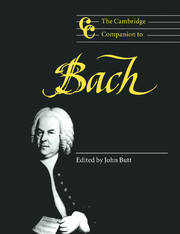Book contents
- Frontmatter
- Introduction
- Part I The historical context: society, beliefs and world-view
- 1 The Bach family
- 2 Bach and the domestic politics of Electoral Saxony
- 3 Music and Lutheranism
- 4 Bach's metaphysics of music
- 5 ‘A mind unconscious that it is calculating’? Bach and the rationalist philosophy of Wolff, Leibniz and Spinoza
- Part II Profiles of the music
- Part III Influence and reception
- Notes
- Select bibliography
- General Index
- Index of works
2 - Bach and the domestic politics of Electoral Saxony
from Part I - The historical context: society, beliefs and world-view
Published online by Cambridge University Press: 28 September 2011
- Frontmatter
- Introduction
- Part I The historical context: society, beliefs and world-view
- 1 The Bach family
- 2 Bach and the domestic politics of Electoral Saxony
- 3 Music and Lutheranism
- 4 Bach's metaphysics of music
- 5 ‘A mind unconscious that it is calculating’? Bach and the rationalist philosophy of Wolff, Leibniz and Spinoza
- Part II Profiles of the music
- Part III Influence and reception
- Notes
- Select bibliography
- General Index
- Index of works
Summary
This essay places Johann Sebastian Bach within the context of the domestic policy of his time. That is unquestionably an unusual viewpoint, since Bach is known as ‘Germany's greatest church composer’, the embodiment of the Lutheran cantor. Nonetheless, we must become accustomed to seeing this man in a political function, because Bach lived in a time of fundamental domestic conflict. Everyone who held a public office had to take a position in this conflict. I have concentrated on the Electorate of Saxony and the city of Leipzig, because Bach reached his ultimate and lasting professional position there; he worked for twenty-seven years, 1723–50, as cantor of the Thomasschule and music director of the city.
Absolutism in the Electorate of Saxony
The fundamental domestic conflict of the era was that between the ruler, who strove for absolute unlimited power, and the Estates, who limited this power. The Estates system or absolutism? – this was the question which even Bach had to face. In the Electorate of Saxony, the Estates essentially comprised two bodies, the nobility and the cities, with spiritual foundations and universities playing a minor role. The Landschaft, the parliament of the Estates, had an extraordinarily complex protocol, proceedings between the various groups usually being conducted in writing. Responsibility for secretarial duties was assumed by the body of cities, with Leipzig presiding over its select committee. The deputies from Leipzig drafted the papers and therefore had a key role in the politics of the Estates.
- Type
- Chapter
- Information
- The Cambridge Companion to Bach , pp. 17 - 34Publisher: Cambridge University PressPrint publication year: 1997
- 13
- Cited by

